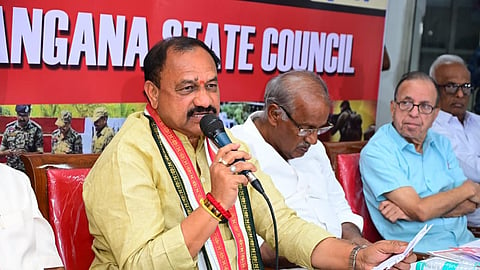

Follow TNM’s WhatsApp channel for news updates and story links.
A round table meeting of political parties and activists held in Hyderabad on Thursday, November 20, expressed serious concern over the killings of Maoists by security forces in Andhra Pradesh over the past two days.
On November 18, security forces killed top Maoist commander Madvi Hidma, his wife Madakam Raje, and four others in Alluri Sitharama Raju district near the Odisha border. The next day, seven others were killed in the same area.
The meeting was organised by the Telangana State Council of the Communist Party of India (CPI), in the backdrop of the killing of thirteen Maoists, including 'most wanted' Hidma, in the last two days.
Condemning the anti-Maoist operation launched by the BJP-led Union government, which has set a March 2026 deadline to “eliminate Naxalism” in India, participants of the meeting questioned why the Union government did not think it fit to announce a ceasefire.
They decided to stage an all-party meeting in protest against the killings near the Ambedkar statue at Tank Bund on Friday, November 21.
Veteran human rights activist and peace negotiator Professor G Haragopal alleged that through the intensified anti-Maoist operations, Union Home Minister Amit Shah was keen to hand over natural resources in tribal-dominated areas to corporates as early as possible to implement the “development agenda” of the BJP.
CPI state secretary K Sambasiva Rao, who presided over the meeting, expressed dismay that the Union government held peace talks with Pakistan but not the Naxalites of its own country, who are fighting for justice for the poor, particularly tribal residents.
Telangana Congress president B Mahesh Kumar Goud questioned why the Union government was not open to peace talks with Naxalites. He questioned why Maoists were not being allowed to surrender and return to the mainstream and were being picked up instead and killed in “fake encounters.”
The Congress in Telangana had previously expressed support for initiating peace talks with the Communist Party of India (Maoist).
Goud mentioned that he himself had witnessed violence by Naxalites at his native village in Nizamabad in his teens, recalling his family’s suffering during that period. He said that the Congress was opposed to violence by both Maoists and the police.
"The Maoists sacrificed their lives for the poor, but the strategy they adopted by brandishing weapons was not acceptable," Goud said.
Telangana Jana Samithi president M Kodandaram said that political movements could never be rooted out by suppression.
The meeting was attended by several intellectuals and activists. Telugu balladeer and activist Vimalakka, who heads the Arunodaya cultural troupe, was also present.
Retired High Court judge Justice Chandra Kumar advised Maoists that it was not the right time to continue their armed struggle.
Communist Party of India (Marxist-Leninist) leader Gurram Vijay Kumar recalled that “encounter killings” or extrajudicial killings of Maoists, first began under Congress rule in erstwhile Andhra Pradesh, under the Chief Ministership of Kasu Brahmananda Reddy in 1969. KBR’s successor, Jalagam Vengal Rao, was then Home Minister. Seven Naxalites were killed on May 27 and 29 of that year in Vengal Rao's home district, Khammam.
As part of the anti-Maoist crackdown in Chhattisgarh in the name of Operation Kagar or Operation Black Forest, the Union government had earlier announced that at least 31 Naxalites were killed as of May 2025. Left parties, activists and others have condemned the extrajudicial killings, questioning whether there were unarmed local residents among those killed.
Following Madvi Hidma’s killing on November 18, Adivasi activists have refused to accept the official version of an “encounter” or exchange of fire. Calling his death a murder, they questioned why Hidma and the other Maoists who were killed were not arrested instead and produced before a court of law.
N Rahul is a senior journalist based in Hyderabad who writes on politics, crime and social issues.